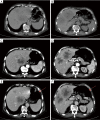Conservative treatment of hepatic portal vein gas after transarterial chemoembolization treatment for liver metastasis of postoperative esophageal cancer: a case report
- PMID: 37201080
- PMCID: PMC10186504
- DOI: 10.21037/jgo-23-213
Conservative treatment of hepatic portal vein gas after transarterial chemoembolization treatment for liver metastasis of postoperative esophageal cancer: a case report
Abstract
Background: Hepatic portal vein gas (HPVG), which is a rare clinical manifestation, is usually considered a sign of critical illness. If the treatment is not timely, it will lead to intestinal ischemia, intestinal necrosis, and even death. There is still no consensus on whether to adopt surgical or conservative treatment for HPVG. Herein, we report a rare case of conservative treatment of HPVG after transarterial chemoembolization (TACE) treatment in a patient with liver metastasis of postoperative esophageal cancer, who received long-term enteral nutrition (EN).
Case description: A 69-year-old male patient, who had undergone surgery for esophageal cancer, needed long-term use of jejunal feeding tube implantation for enteral nutritional support due to postoperative complications. About 9 months after the operation, multiple metastases of the liver were detected. To control the progress of the disease, TACE was conducted. EN was restored on the second day after TACE, and the patient was discharged on the fifth day. On the night of discharge, the patient suddenly experienced abdominal pain, nausea, and vomiting. Abdominal computed tomography (CT) showed that the abdominal intestinal lumen was obviously dilated, liquid and gas plane shadowing was visible, and gas was visible in the portal vein and its branches. The physical examination showed that peritoneal irritation was present, and bowel sounds were active. Blood routine examination showed an increase in neutrophil and neutrophil. Symptomatic treatment, including gastrointestinal decompression, anti-infection, and parenteral nutritional support, was provided. On the third day after the presentation of HPVG, abdominal CT reexamination showed that HPVG had disappeared and the intestinal obstruction was relieved. Repeated blood routine shows a decrease in neutrophil and neutrophil.
Conclusions: Elderly patients who require long-term EN support should avoid early EN support after TACE, as this can prevent intestinal obstruction and HPVG. If the patient suddenly experiences abdominal pain after TACE, CT scan should be performed in a timely manner to determine whether there is intestinal obstruction and HPVG. If the above type of patient experiences HPVG, conservative treatments such as early gastrointestinal decompression, fasting, and anti-infection treatment can be provided first without high-risk factors.
Keywords: Hepatic portal vein gas (HPVG); case report; enteral nutrition; liver metastasis; transarterial chemoembolization (TACE).
2023 Journal of Gastrointestinal Oncology. All rights reserved.
Conflict of interest statement
Conflicts of Interest: All authors have completed the ICMJE uniform disclosure form (available at https://jgo.amegroups.com/article/view/10.21037/jgo-23-213/coif). The authors have no conflicts of interest to declare.
Figures





References
-
- Wolfe JN, Evans WA. Gas in the portal veins of the liver in infants; a roentgenographic demonstration with postmortem anatomical correlation. Am J Roentgenol Radium Ther Nucl Med 1955;74:486-8. - PubMed
-
- Susman N, Senturia HR. Gas embolization of the portal venous system. Am J Roentgenol Radium Ther Nucl Med 1960;83:847-50. - PubMed
Publication types
LinkOut - more resources
Full Text Sources
Research Materials
Miscellaneous
